Does anyone know when the ealiest 1967 with N36 Telescopic Steering was delivered? I read somewhere once that the option was not available for early 67's because it wasn't ready or something. I recently bought a 1967 coupe. It is VIN # 913, a September 1966 car. The original tank sticker shows that it was ordered with N36 Telescopic Steering, but the option was lined out with a pencil with a "Bob" next to it. The car has a standard "early" column now. The column appears to have been removed long ago (for repair?) and the collar crudely painted. I don't see a date stamp on it, but I might have to remove the paint. The car is otherwise fully optioned, needs full resto, and is pretty original down to the shock absorbers. Should this car still have a telescopic column?
Early 1967 with N36 Telescopic
Collapse
X
-
Re: Early 1967 with N36 Telescopic
That was Bob Blubaugh, the Reliability Supervisor at the time, and later, Chief Inspector; he (or one of his engineers) had to sign off on all deviations from the original dealer order specs, normally with an "RN" number, to get the car past Security at the shipping gate. The "RN" number both indicated Engineering approval and allowed plant inventory records to be corrected for the substitution.- Top
-
Re: Early 1967 with N36 Telescopic
Doug -
The window sticker was computer-printed in the same carbon stack as the tank sticker and Car Shipper, so it had the same items on it; I don't recall if the plant created and printed a new one when a substitution was made or not. Photo below shows the date stamped on the bottom surface of the steering column bowl on my '67 (151 7 = 151st day, 1967).Attached Files- Top
Comment
-
Re: Early 1967 with N36 Telescopic
I owned 693 (think that was the number) and it had the option lined out and it didn't come with a tele wheel. I believe the window sticker didn't have the option on it.
I have build sheets from two '63 fuelies with quick take off wheels and the window stickers don't have the option on them.- Top
Comment
-
Re: Early 1967 with N36 Telescopic
The rumor mill has it there were "problems" with the early 67 telescopic column!
Also, there were rumors that GM replaced the early 67 telescopic columns when and if they were found.
One of those 67's was found in a junk yard totaled. It's telescopic column was removed and replaced by GM. That was witnessed by one of our early NCRS members.
Sounds like GM was trying to either avoid or escape some scum sucking lawyer. Er, no offense to you standing upright lawyers out there!!!!!!
JR- Top
Comment
-
Re: Early 1967 with N36 Telescopic
Nick,
I know that there was a problem with some of the early 1967, first generation steering column lower bearings. I thought that they were campaigned to install a new steering shaft and new lower bearing package. However, all I have been able to find is a campaign on 1967 A-car and Corvair energy absorbing (EA) steering columns by searching the NHTSA files. (NHTSA 66V032001 Chevrolet Chevelle)
Unfortunately, one of the engineers that remembered most of the original history on the first generation EA columns died about a year ago. He was on my short list to interview, but alas, my list wasn't short enough.
The 65-66 Corvette telescoping steering column had a solid lower steering shaft (as were nearly all steering column steering shafts before 1967.) Those shafts were nearly indistructable. Of course they could also become a spear shoving the steering wheel and steering shaft out of the column and directly into the driver in a severe frontal collision.
So the energy absorbing, collapsible steering column was created by General Motors and Saginaw Steering Gear Division to be introduced for the 1967 model year. The steering shaft was designed in two pieces where a hollow tubular lower steering shaft engaged a solid upper shaft. The two pieces were held together by injected plastic. The plastic sheared and the two shafts telescoped over each other in a severe frontal crash.
The older 65-66 Corvette telescoping columns, (and virtually all other model GM columns) had a mast jacket that was just a welded tube that extended from the floor pan up to the housing just below the steering wheel. It was very rigid and stable. That is why the earlier steering columns just mounted into the dash structure with simple straps.
For 1967 there needed to be a completely new design mast jacket and steering column. The steering column had to collapse several inches as well as absorbing the energy of an unbelted driver as his/her chest smashed against the steering wheel. Saginaw came up with an entirely new steering column concept. One that utilized a thin wall, expanded mesh jacket that absorbed energy as it collapsed.
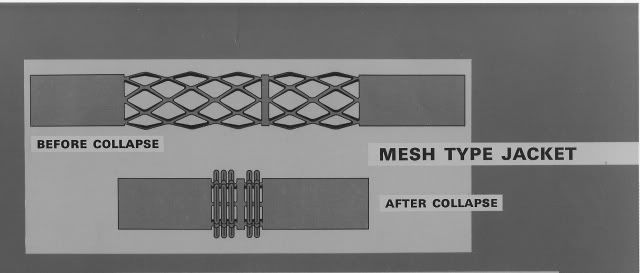
The unfortunate part was that the whole column was no longer very stable. All of the collapsible, and telescoping steering column components were quite whimpy in bending. That is why the GM steering columns in the 1967-68 era have very large mounting brackets with three and four aluminum, break away capsules that mount up into the dash structure.
With the introduction of the locking steering column in 1969, Saginaw determined that the "whimpy" mesh design steering column mast jacket was no longer going to be suitable with the additional mass (i.e. locking bolt, ignition lock cylinder, locking plate, etc) in the column head. So the Advanced Product Engineering Department at Saginaw came up with a new design "ball energy absorbing steering column mast jacket".
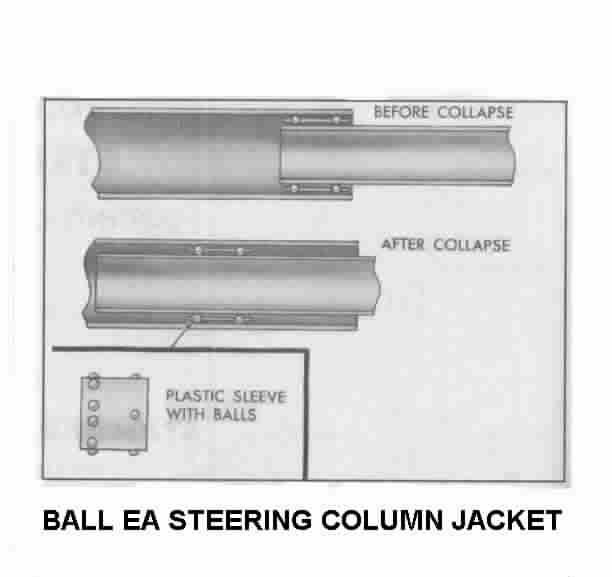
This mast jacket was much more stable and rigid. You can note that all GM steering columns from 1969 onward had very simple, light weight, break away, 2 capsule mounting brackets.
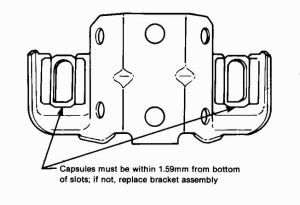
One feature of the first generation EA column was the hollow lower steering shaft. Part of the design required a snap ring groove to be machined into the lower steering shaft so that a retaining ring could be used to hold the lower column bearing in place. If the steering column was not aligned correctly into the vehicle body, a large bending moment could be generated in the lower steering shaft. This could cause the steering shaft to fracture right in the snap ring groove. It also was found that in some misalignment cases the lower bearing could come apart and the hardened bearing races would tend to "saw" through the hollow steering shaft.
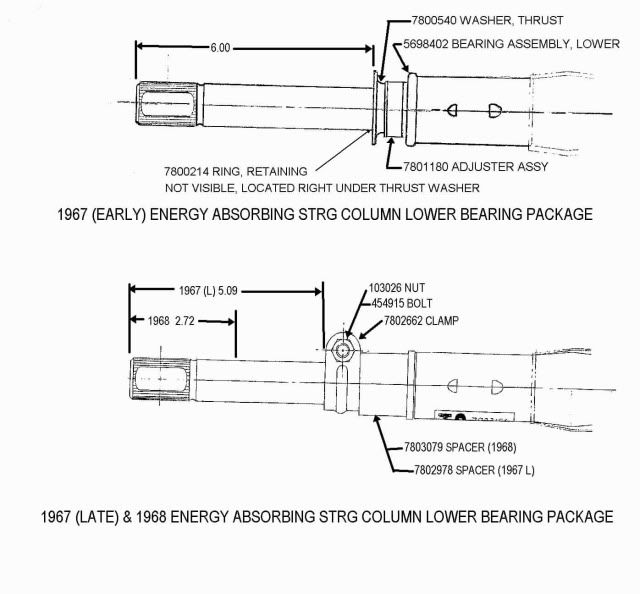
That is why the steering shaft was redesigned to eliminate the snap ring groove and a clamp with a nut and bolt was used to retain the lower bearing. The lower bearing was also redesigned at the same time.
I thought that all Corvette 1967 (early) steering columns were campaigned. .However, I have not been able to find any documentation on this matter. Maybe this is the "secret" campaign that you are relating. I would think that any campaign would have been directed toward all Corvette steering columns and not just the telescoping design. If the 1967 telescoping column was late, it might have been because of production tooling issues.
So much for EA Steering Columns 101.
Jim- Top
Comment
-
Re: Early 1967 with N36 Telescopic
Here is a little more history that I have been able to dig up.
There were three standard (non-adjustable) 1967 Corvette steering columns.
The first was 5698346 which was drawn on 9-12-66. (Awfully late for 1967 production.) This column has a snap ring retained lower bearing.
The second was 7802101 and was released for production on 11-16-66. This has a lower bearing clamp in place of the snap ring and a different lower bearing than 5698346.
The third column was 7803156 and was released for producion on 2-6-67. It has the same clamp and bearing as 7802101.
Now the interesting part concerning the telescoping column. I have only been able to find one 1967 telescoping column part number and drawing.
It is 7803280 and was released for production on 3-6-67 (3/4 of the way through the 1967 model year!) It has the same lower bearing and clamp as the 7802101 standard column which was released 3 1/2 months earlier.
Possibly Joe Lucia can find an earlier part number for a 1967 telescoping steering column. If 7803280 is the only part number for a 1967 telescoping column, then there were probably other reasons than the lower steering shaft and bearing that caused this option to be extremely late for production.
Jim- Top
Comment
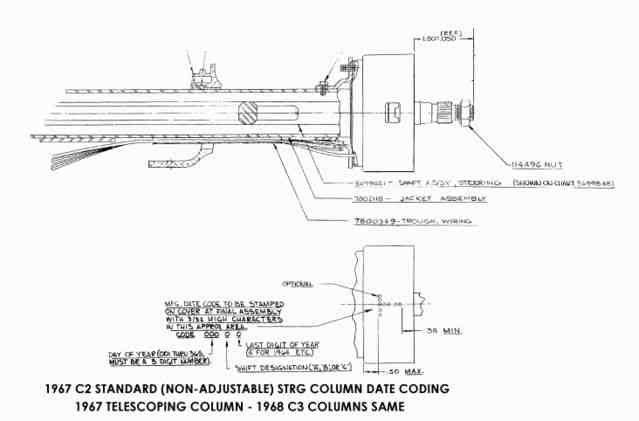
Comment